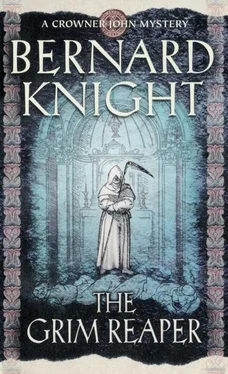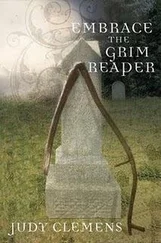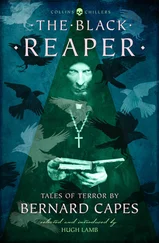Bernard Knight - The Grim Reaper
Здесь есть возможность читать онлайн «Bernard Knight - The Grim Reaper» весь текст электронной книги совершенно бесплатно (целиком полную версию без сокращений). В некоторых случаях можно слушать аудио, скачать через торрент в формате fb2 и присутствует краткое содержание. Год выпуска: 2002, ISBN: 2002, Издательство: Simon and Schuster, Жанр: Исторический детектив, на английском языке. Описание произведения, (предисловие) а так же отзывы посетителей доступны на портале библиотеки ЛибКат.
- Название:The Grim Reaper
- Автор:
- Издательство:Simon and Schuster
- Жанр:
- Год:2002
- ISBN:9780671029678
- Рейтинг книги:5 / 5. Голосов: 1
-
Избранное:Добавить в избранное
- Отзывы:
-
Ваша оценка:
- 100
- 1
- 2
- 3
- 4
- 5
The Grim Reaper: краткое содержание, описание и аннотация
Предлагаем к чтению аннотацию, описание, краткое содержание или предисловие (зависит от того, что написал сам автор книги «The Grim Reaper»). Если вы не нашли необходимую информацию о книге — напишите в комментариях, мы постараемся отыскать её.
The Grim Reaper — читать онлайн бесплатно полную книгу (весь текст) целиком
Ниже представлен текст книги, разбитый по страницам. Система сохранения места последней прочитанной страницы, позволяет с удобством читать онлайн бесплатно книгу «The Grim Reaper», без необходимости каждый раз заново искать на чём Вы остановились. Поставьте закладку, и сможете в любой момент перейти на страницу, на которой закончили чтение.
Интервал:
Закладка:
He shook his head, his black hair bouncing on the collar of his grey tunic. ‘The poor fellow’s daughter is being brought in tomorrow morning. I had him buried in the Jew’s plot in Southernhay until it’s decided where he shall rest permanently.’
Matilda had no interest in dead Jews and abruptly changed the subject. ‘I hear the Justices are due in the city very soon. I hope you’ll assert the seniority of your office and not skulk in the background, as usual.’
‘I’ll do what my duties demand — no more, no less,’ he grunted.
‘I wonder where they will be lodged. Richard says there’s no suitable accommodation for them in that miserable castle.’
That was true enough, thought John. Lady Eleanor, the sheriff’s glacial wife, refused to live in that bleak fortress with her husband, preferring one of their manors at Tiverton or Revelstoke, which suited de Revelle well enough, as John knew that he was fond of entertaining loose women in the bedchamber behind his office.
Matilda clung to the subject of the King’s judges. ‘I trust that Bishop Marshall will give a feast in their honour. Certainly we would be invited — I will have a chance to wear my new brocade kirtle.’
De Wolfe sometimes found it hard to reconcile her religious fervour with her devotion to fine clothing, eating, drinking and her desire to be a county notable. Almost as if she was reading his mind, she added weight to his already considerable burden: ‘Speaking of feasts, there was a message earlier, brought by a guildsman’s servant. We are invited to a banquet at the Guildhall on Thursday night.’ De Wolfe groaned at the thought of another evening jammed at a table with pompous merchants and their snobbish wives, to say nothing of the pious clerics and drunken craftsmen who gravitated to these celebrations.
‘Who is it this time? Must we accept?’ he muttered.
‘Of course we must, John! It’s your duty as the King’s coroner to grace these events. This one is given by the Guild of Tanners, very influential people. A friend of mine at St Olave’s is the wife of one of their Wardens.’
‘Tanners? They stink, it’s the dog turd they use in their fleshing vats.’
‘My friend doesn’t stink, I assure you,’ snarled an outraged Matilda. She hauled herself to her feet and plodded angrily to the door. ‘I’m going to get ready for my devotions. See that Mary has your best tunic washed for you to wear on Thursday night.’
As she slammed the door to the vestibule behind her, her husband sighed and dropped the remains of the chicken under the table for Brutus.
The church of All Hallows-on-the-Wall was empty, the few worshippers at Vespers long gone. The setting sun shone through the two slatted windows high up on the west wall, its beams almost solid in the dust thrown up by the angry strokes of the bundle of twigs that Ralph de Capra was using as a broom. The little building was paved with irregular stone slabs and though this was cleaner than the usual floor of beaten earth, the priest still muttered under his breath at the dried mud and wisps of straw and rushes that his parishioners had brought in on their shoes. He was a thin, miserable man, looking considerably older than his thirty-eight years. A hare-lip and a crusted skin ailment on his scalp, poorly concealed by his thin brown hair, did little to enhance his appearance.
The priest drove the debris towards the door and, with a few final flourishes, swept it down the two steps on to the narrow street that ran inside the city wall. Then he straightened up and walked down to the centre of the lane, besom still in hand. To his left stretched Little Britayne, with its criss-crossing mesh of hovel-lined alleys running up the hill towards the centre of the town. A night-soil cart pulled by a donkey was coming towards him, pursued by ragged, jeering urchins, who yelled abuse at the scarecrow of a man perched on the crossboard. A few pigs snuffled around the bottom of the high city wall and further up, where the wall turned at the Snail Tower, de Capra could see a small crowd gathered around two drunks who were futilely trying to fight each other, though they could hardly stand.
Directly across from the church, the bottom end of Fore Street climbed up to become High Street at Carfoix, the central crossing of Exeter. Clusters of townsfolk thronged it, some hurrying on errands, some buying and selling at the booths along its edges, others just lounging in the evening sun.
He turned to look at his little church which was now an integral part of the city wall, its other three walls projecting into the roadway. Like most of the many churches in Exeter, it was a simple oblong, like a barn. Some of the others were still timber-built, but many were gradually being replaced with stone — several even had little towers.
De Capra climbed the steps back into his domain, bent his knee briefly in the direction of the simple altar then went to the other end of the church where wooden screens partitioned off a small space against the far wall. Here he kept his simple vestments, an alb of heavy linen, a rather threadbare brocade stole and a maniple. A stone jar held some cheap wine and a small wooden box did duty as a pyx, to store the wafers bought at a cook-stall, which he used to prepare the Host for Mass.
He dropped the broom alongside a leather bucket and battered shovel, then went back down to the other end of the building. The chancel was merely a wooden platform, two steps up from the main floor. The altar was a small table covered with a white cloth, carrying two wooden candlesticks and a tin cross covered in peeling gilt. On the wall above, below the high window slits, was a large, crudely carved crucifix. The only other furniture was a kneeler for his own prayers and a heavy chair for the Bishop or Archdeacon, should they ever deign to take part in a service here. This was a poor church in the poorest part of the city, Britayne being so named because five hundred years ago, the ‘Britons’, the original Celtic inhabitants, had been pushed back by their Saxon conquerors into that least savoury part of Exeter.
De Capra turned his kneeler to face the altar and, after making the Sign of the Cross, lowered himself on to it and leaned forward, his hands clasped on the top bar, polished by years of use. He fixed his eyes on the image of Christ hanging on the wall, and his lips moved in earnest supplication, which gradually rose to an audible monologue. He had a secret that plagued most of his waking hours, and he desperately needed a sign to relieve his troubled conscience. He talked to himself for many minutes, becoming more and more agitated. Then his head fell on to his arms and he subsided into racking sobs.
The next morning, the Wednesday of an eventful week, the manor-reeve of Sidbury, a village some miles east of Exeter, rode in to report a fatal accident. He had left just before dawn and arrived at Rougemont a couple of hours later. The sentry at the castle gate sent him up to the coroner’s garret, where Gwyn and Thomas were waiting for their master to arrive.
De Wolfe appeared when the reeve was halfway through his story, but soon caught up with the tragic tale. One of the boy labourers at the manor mill had been trapped in the machinery and was dead. ‘Our bailiff knew that under this new crowner’s law, we had to report it to you straight away, sir,’ the village headman ended. He was a wiry fellow with a narrow but intelligent face, seemed somewhat in awe of the coroner and stood screwing his pointed woollen cap between his strong fingers as he spoke.
‘You did right, man. I must come to view the body and hold an inquest — but it will be noon before we can set off.’ The reeve was sent away for a few hours to fill his stomach and feed his horse, while de Wolfe settled his agenda with his officer and clerk.
Читать дальшеИнтервал:
Закладка:
Похожие книги на «The Grim Reaper»
Представляем Вашему вниманию похожие книги на «The Grim Reaper» списком для выбора. Мы отобрали схожую по названию и смыслу литературу в надежде предоставить читателям больше вариантов отыскать новые, интересные, ещё непрочитанные произведения.
Обсуждение, отзывы о книге «The Grim Reaper» и просто собственные мнения читателей. Оставьте ваши комментарии, напишите, что Вы думаете о произведении, его смысле или главных героях. Укажите что конкретно понравилось, а что нет, и почему Вы так считаете.












